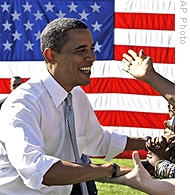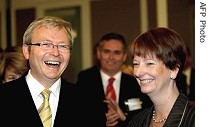-
(单词翻译:双击或拖选)
For months, the exhausting race to the White House has dominated the Australian media.
The collective might of America's economy, its military and culture dictates1 much of what happens around the world. Geoffrey Garrett, the head of the U.S. Studies Centre at the University of Sydney, thinks this presidential election matters more than most others in recent memory.
"I think the stakes are higher here not only in the U.S. but globally simply because the American reaction to September 11 [2001] has made the 2000s a pretty antagonistic2 decade and I think the world is watching now to see if the U.S. can come back into the global mainstream3 more," said Garrett.
 |
| Senator Barack Obama campaigning in Cincinnati, Ohio, 09 Oct. 2008 |
A recent worldwide survey about the U.S. election showed that 76 percent of Australians want Democratic candidate Barack Obama to win, and 10 percent prefer his Republican rival John McCain.
In the poll, by Readers' Digest, 17 percent of Australians surveyed said they were in favor of the U.S. government, against 67 percent who were neutral about it and 15 percent who opposed it.
However, 58 percent said their opinion of the U.S. would improve if Obama is elected, against 15 percent for McCain.
The two countries have been close allies since the early 1950s. It is an enduring alliance that saw Australian troops serve in the Vietnam War, as well as more recently in Iraq and Afghanistan.
Canberra needs the relationship - and the guarantees of military assistance that go with it - far more than Washington does. Australia's commitment to conflicts in Iraq and Afghanistan is what experts describe as "alliance maintenance" - a diplomatic necessity to ensure that the security umbrella the U.S. provides remains4 intact.
Garrett says Australia could see the next U.S. administration asking for additional help in Afghanistan.
"Kevin Rudd, the Australian prime minister, not only said he wanted to withdraw combat troops from Iraq, he said that Afghanistan was 'the right war,' which, of course, is what Barack Obama has said," he said. "So, I would imagine that the next U.S. president is going to come calling on Prime Minister Rudd asking for more Australian involvement in Afghanistan in 2009 or 2010."
Despite the close relationship with the U.S., Australians have been generally disappointed with the administration of President Bush. In one University of Sydney poll last year, 45 percent of Australians had unfavorable views of the U.S. government.
However, former Deputy Prime Minister Kim Beazley does not think that public opinion here has turned against the U.S. alliance.
"Even though there are high levels of disapproval5 of the Iraq war and unfortunately also at the moment of our engagement in Afghanistan, there's been only glacial movement in the underpinning6 support for the United States alliance," said Beazley. "That is not necessarily the case elsewhere around the world. That is probably unique to Australia."
Mr. Beazley thinks the world's current financial problems will help Barack Obama win what he calls "most captivating U.S. election since the Kennedy-Nixon race in 1960."
"I personally think but for this economic meltdown he probably would not have fallen across the line," he said. "Now it looks as though he likely will."
 |
| Prime Minister Kevin Rudd with deputy, Julia Gillard in Canberra (file) |
A year ago voters in Australia ushered7 in a new political when Labor8 leader Kevin Rudd swept to victory in national elections, ending a decade of conservative government. There is an expectation here that Americans will do the same on November 4.
"First black president and all. I mean, that's probably the first thing people are looking at," said one Australian. "Yeah, the possibility that could happen in a country that's seen as being so racist9 America, yeah definitely.
Some Australians, however, are not convinced that the Illinois senator has what it takes to lead the world's most powerful nation.
"Obama - I have great hesitation10 thinking of the world as it is at the moment and how dangerous it is. More or less the unknown. I think he's very much new blood and very interesting that way," said one woman. "McCain I think is very much the old school - that's how I look at him. But he's probably someone I'm not so interested in but maybe he's safe to a lot of people."
In another recent survey, by the Gallup organization, 76 percent of Australians said they thought the U.S. election would have an effect in their own country. In that poll, 64 percent of Australians wanted Obama to win, against 14 percent who favored McCain.
 收听单词发音
收听单词发音
1
dictates

|
|
| n.命令,规定,要求( dictate的名词复数 )v.大声讲或读( dictate的第三人称单数 );口授;支配;摆布 | |
参考例句: |
|
|
|
2
antagonistic

|
|
| adj.敌对的 | |
参考例句: |
|
|
|
3
mainstream

|
|
| n.(思想或行为的)主流;adj.主流的 | |
参考例句: |
|
|
|
4
remains

|
|
| n.剩余物,残留物;遗体,遗迹 | |
参考例句: |
|
|
|
5
disapproval

|
|
| n.反对,不赞成 | |
参考例句: |
|
|
|
6
underpinning

|
|
| n.基础材料;基础结构;(学说、理论等的)基础;(人的)腿v.用砖石结构等从下面支撑(墙等)( underpin的现在分词 );加固(墙等)的基础;为(论据、主张等)打下基础;加强 | |
参考例句: |
|
|
|
7
ushered

|
|
| v.引,领,陪同( usher的过去式和过去分词 ) | |
参考例句: |
|
|
|
8
labor

|
|
| n.劳动,努力,工作,劳工;分娩;vi.劳动,努力,苦干;vt.详细分析;麻烦 | |
参考例句: |
|
|
|
9
racist

|
|
| n.种族主义者,种族主义分子 | |
参考例句: |
|
|
|
10
hesitation

|
|
| n.犹豫,踌躇 | |
参考例句: |
|
|
|















